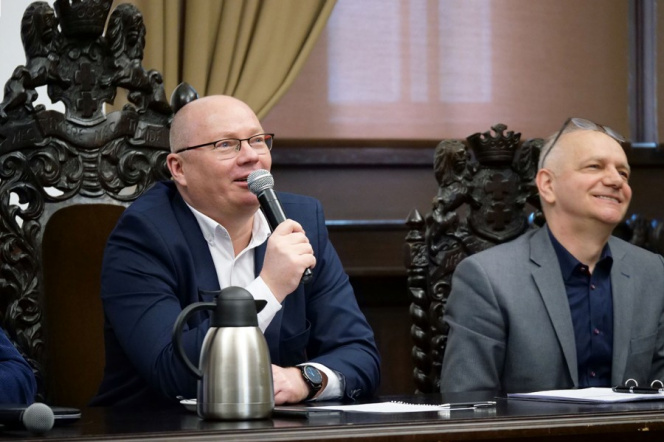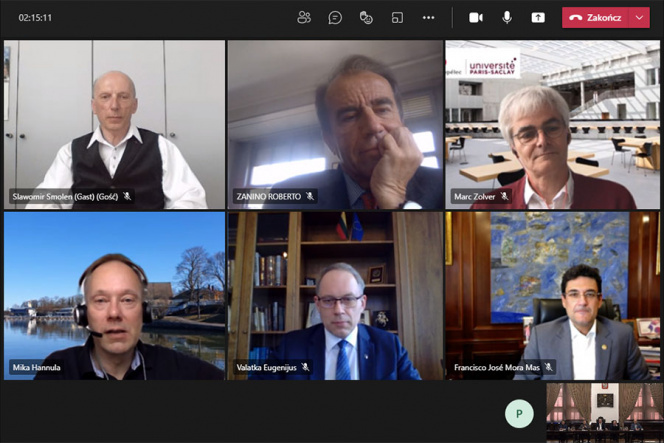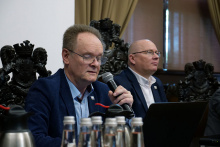Date added: 2021-05-12
Kickoff Meeting of the International Scientific Effectiveness Board of IDUB

The plan provides that the board members should be “scientists with experience in processes of reorganizing and managing the university”. The ISEB members appointed by the Rector undoubtedly satisfy this provision by a wide margin. They are: Mika Hannula (Vice-Rector for Partnerships and Strategic Engagement, University of Turku, Finland), Francisco José Mora Más (Rector, Universitat Politècnica de Valencia, Spain), Sławomir Smoleń (professor, Hochschule Bremen, Germany), Eugenijus Valatka (Rector, Kaunas University of Technology, Lithuania), Roberto Zanino (Vice-Rector for European Relations, Politecnico di Torino, Italy), Marc Zolver (Vice-President for International Affairs, CentraleSupélec / Université Paris-Saclay, France). The Board appointed Francisco José Mora Más as the ISEB Chair.

The meeting—in the form of a videoconference—was attended by the Rector and vice-rectors of Gdańsk Tech. Participating was also Dr Monika Wieczerzak, member of the IDUB Project Implementation Team. Two introductory presentations were delivered by Gdańsk Tech: (1) ”Introduction to Gdańsk Tech” by Janusz Nieznański, Vice-Rector for Internationalization and Innovation, and (2) ”IDUB Project at Gdańsk Tech” by Sławomir Milewski, Vice-Rector for Scientific Research. An open discussion followed the presentations and all ISEB members took active part in it.
The focal issue in the discussion was the consolidation of universities—in the context of the announced federation plans of Gdańsk Tech, University of Gdańsk, and Medical University of Gdańsk. The related experiences of ISEB members and their universities are a source of precious expert knowledge and advice on the opportunities and risks of academic consolidations. CentraleSupélec, for instance, is one of the founding entities of the new collegiate university—named Université Paris-Saclay (UPSaclay). This university was ranked 14th in the world in the 2020 Academic Ranking of World Universities (Shanghai Ranking), meaning the highest position among the universities from continental Europe. Marc Zolver of CentraleSupélec / UPSaclay briefly reported on his experiences and reflexions related to the Paris-Saclay merger (started in 2012). He underlined that the consolidation proces must respect the identity and autonomy of people and the merging establishments. Building the true spirit of community within UPSaclay has not been completed yet, but the great success in the Shanghai Ranking—significantly surpassing the assumptions and expectations—has strongly confirmed the validity of the merger.
Prof. Mika Hannula of the University of Turku recalled his experiences with the merger of Tampere University of Technology (where he was President in 2016–2018) and the University of Tampere which led to the creation of Tampere University in 2019. He laid stress on the importance of common values and common targets which should be clearly expressed in writing. Prof. Eugeniujus Valatka of Kaunas University of Technology gave a brief comment on the unsuccesful attempts to consolidate the Kaunas universities. The negotiations took place 5 years ago, but there was no sufficient sense of common targets and the financial support offered by the government was far from encouraging. Prof. Sławomir Smoleń of Hochschule Bremen, in turn, underlined the risks connected with ubiquitous excess of discussions and shortage of bold decision making in various consolidation processes.
The meeting proceeded in a very friendly and cooperative atmosphere. All participants expressed the hope that the next ISEB meeting will take place in person at Gdańsk Tech campus.
Given below are brief bios of the ISEB members:
Mika Hannula (University of Turku, Finland)
MSc and DSc in industrial engineering and management, Tampere University of Technology TUT). Career at TUT: Head of the Department of Business Information Management and Logistics (2002–2009). Dean of the Faculty of Business and Technology Management (2020–2013). Professor of Information and Knowledge Management (2001–2016). Vice President for Education (2014–2016). President (2016–2018). Career at University of Turku: Senior Executive and professor (since 2018). Vice Rector for Partnerships and Strategic Engagement (since 2020). Other universities: Vice President for Education, Adjunct Professor, Finnish, National Defense University (since 2011). Adjunct Professor, University of Tampere (since 2003). Chairman of the Council, Academic Engineers and Architects in Finland TEK (since 2020). Expert in general and change management, industry-university collaboration, learning environments, strategic planning, higher education, ICT and entrepreneurship.
Francisco José Mora Más (Universitat Politècnica de Valencia, Spain)
Telecommunication Engineer from the Universitat Politècnica de Catalunya, Spain (1991). During the years 1993-1997, the European Particle Physics Laboratory (CERN) granted him a "Doctoral Student" scholarship to carry out his doctoral thesis in the electronics and data acquisition group of the ATLAS experiment. PhD in Telecommunication Engineering from the Universitat Politècnica de València (UPV) (1997). Since 2003 he is Full-Professor at the UPV in the area of Electronic Engineering. Prof. Mora is Vice-president of the Conference of Rectors of Spanish Universities, Vice-president of the Spanish Association of Science and Technology Parks, and President of the entrepreneurship network “RedEmprendia”. Prof. Mora is completing his second mandate as Rector of the UPV after having been reelected in 2017.
Sławomir Smoleń (Hochschule Bremen, Germany)
Eugenijus Valatka (Kaunas University of Technology, Lithuania)
PhD in Chemical Engineering (2000, Kaunas University of Technology). Co-author of more than 80 scientific publications. Supervisor of 5 completed PhD projects. Scientific research interests: electrocatalysis, energy storage, chemical kinetics. Lecturer in physical chemistry. Current responsibilities and memberships: Rector of Kaunas University of Technology (elected in 2018); President of Lithuanian University Rectors’ Conference; President of Santaka Integrated Centre (Valley) of Science, Studies and Business; Member of Board of Lithuanian Radio and Television, Education Council of Lithuania, Scientific Board of Lithuanian Energy Institute, and International Society of Electrochemistry (ISE).
Roberto Zanino (Politecnico di Torino, Italy)
MSc in nuclear engineering and PhD in energy engineering from Politecnico di Torino (PoliTo). Long-term research missions at the Max-Planck Institut für Plasmaphysik in Garching, Germany, and the MIT Plasma Science and Fusion Center in Cambridge (MA), USA. Professor of nuclear engineering at Dipartimento Energia, PoliTo, since 2000, where he leads the Nuclear Engineering Modeling (NEMO) group. Director of Alta Scuola Politecnica in 20078–2010. Head of graduate studies in Energy Engineering at PoliTo in 2011–2017. Vice Rector for European Relations at PoliTo since 2018. Since 2019 member of the Board of Directors of the CESAER association. Member of the Steering Committee for the UNITE! European University Alliance. Since 2017, Vice President of the Italian university consortium for nuclear technologies (CIRTEN) and since 2019 a member of the EURATOM Scientific and Technical Committee. Visiting Full Professor of Nuclear Engineering at the Peter the Great Polytechnic University in St. Petersburg, Russia. International Faculty Affiliate to the University of Illinois in Chicago, USA, Department of Mechanical and Industrial Engineering.
Marc ZOLVER (CentraleSupélec / Université Paris-Saclay, France)
Engineer in Fluid Mechanics and Acoustics from Ecole Centrale de Lyon. He started his career in 1990 as research-assistant in the Nice Observatory (France) and the European Southern Observatory (Germany). In 1993 recruited by IFP-Energies Nouvelles as research engineer in Computational Fluid Dynamics in Engines (research & development in CFD codes for Internal Combustion Engines). In 2004 he joined Ecole Centrale Paris to set up the "Centrale Pékin" project as vice-dean during 4 years in Beijing. Centrale Pékin is a Franco-Chinese cooperation between the Group of Ecoles Centrale (Paris, Lyon, Nantes, Lille, Marseilles) and Beihang University (Beijing). In 2008 back to France to join the Ecole Centrale Paris International Relations team as vice-dean. In 2015, at the merger of Ecole Centrale Paris and Supélec, he became Vice-President for International Affairs at CentraleSupélec, now a component establishment of the Université Paris-Saclay. In 2008–2018 the coordinator for CentraleSupélec in the T.I.M.E. Association. Since 2019 member of the Board of Directors of the CESAER association.


